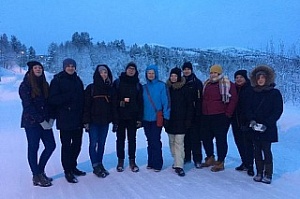In the Norwegian city of Bardufoss (Tromsø district), the Molecular Response Properties Winter School 2019, the international Winter School for Physicists, has concluded. It was conducted by TSU in collaboration with The University of Tromsø - The Arctic University of Norway, KTH Royal Institute of Technology, and the French National Center for Scientific Research. 57 students and graduate students from 10 countries took part. The classes were conducted by the creators of the Dalton and DIRAC quantum-chemical calculation programs, in which young physicists work.
This is the second school conducted under the Russian-Norwegian educational project Optical Probe Sensors at Biological Environments (OPS @ BE).
The Winter School program has grown out of a desire to assemble the basic theoretical foundations necessary in the daily work of young scientists who study the spectroscopic properties of molecules using quantum and chemical calculation methods, - says Olga Tchaikovskaya, Professor at the Faculty of Physics. - The school was aimed at showing how a young scientist would be right to study the properties of a molecule when excited using theoretical models. For this, it is necessary to understand the final expected result of the theoretical model and computational program.
The shortlisting for the School was made by competition; the participants were required to have a good basic education in classical and quantum mechanics, electrodynamics, and the English language. 57 physicists from 10 countries came to Norway, Russia was represented by 14 students (TSU, TPU, SibMGU, SPbU, and KSU named after N.F. Katanov) and 4 TSU employees.
The program included theoretical lectures and practical exercises conducted by direct creators of quantum chemical calculation programs to study the properties of Dalton and DIRAC polyatomic systems: Kenneth Rudd, Professor at the Arctic University of Norway; Patrick Norman, Professor at the at KTH Royal Institute of Technology; and Trond Saue, director of the French National Center for Scientific Research.
- My scientific work is devoted to the photophysical properties of organic complexes and their further use in OLED devices, and the theoretical foundations of various light interactions with matter and other electromagnetic radiation were discussed at the school, - Alexander Kurtsevich, a graduate student of the TSU Biophotonics program, shared his impressions – The participation in the School significantly expanded my theoretical knowledge.
According to the plan of the OPS @ BE project, the organizers will hold three more scientific schools for undergraduate and graduate students in Russia and Norway.

